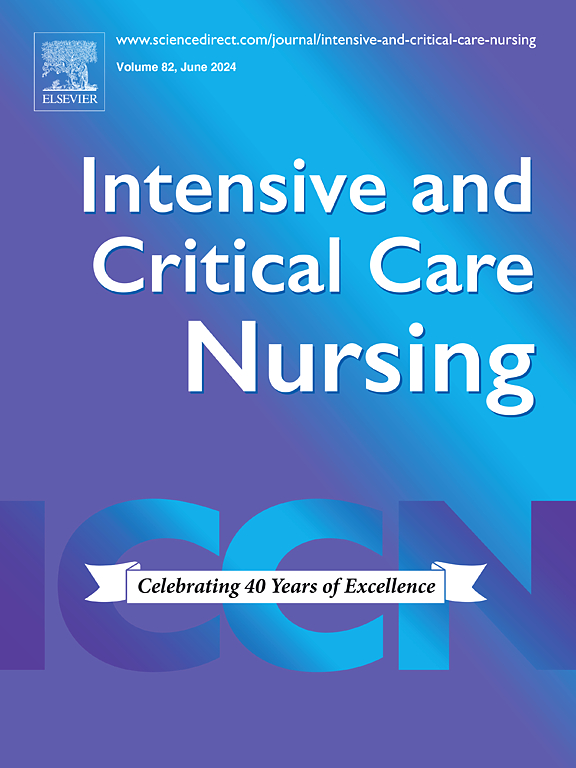Intensive care nurses’ attitudes about the importance of family involvement in adult intensive care: A multicentre cross-sectional study
IF 4.9
2区 医学
Q1 NURSING
引用次数: 0
Abstract
Introduction
Family involvement in intensive care (IC) benefits patients and families, but requires nurses to go beyond. ICU nurses are facing the additional task of offering support for family members and involving them in care activities. This requires a positive attitude towards family participation. This study aims to describe the attitudes of ICU nurses towards involving family members in nursing care and to investigate the association of demographic and professional characteristics with these attitudes.
Methods
A cross-sectional study was conducted in ten hospitals across the Netherlands. ICU nurses received an online questionnaire including the Families Importance to Nursing Care (FINC-NA) scale (with scores ranging from 22 to 110). The data were analysed using descriptive statistics and multiple linear regression.
Results
The FINC-NA questionnaire was completed by 583 ICU nurses (42% response rate). The mean attitude of ICU nurses was 73.3 (SD 8.78). In general, ICU nurses viewed the family as important in care provision. However, ICU nurses showed a less positive attitude on the subscales “promoting family involvement’’ and “family as a burden’’. A less positive attitude towards family involvement was significantly associated with working more clinical hours per week and ICU nurses working in a university hospital rather than a teaching hospital.
Conclusion
ICU nurses showed a less positive attitude towards involving families in care compared to nurses from other clinical settings.
Implications for Clinical Practice
In order to establish a more family focused approach in clinical practice, special attention is needed for ICU nurses who work more clinical hours and in a university hospital. Besides, guidelines on family involvement in the ICU may improve nurses’ attitudes.
重症监护护士对成人重症监护中家庭参与重要性的态度:一项多中心横断面研究
家庭参与重症监护(IC)有利于患者和家庭,但需要护士超越。ICU护士面临着为家庭成员提供支持并让他们参与护理活动的额外任务。这需要对家庭参与持积极态度。本研究旨在描述ICU护士对家庭成员参与护理的态度,并探讨人口统计学和专业特征与这些态度的关系。方法在荷兰10家医院进行横断面研究。ICU护士收到一份在线问卷,包括家庭护理重要性(FINC-NA)量表(得分范围从22到110)。采用描述性统计和多元线性回归对数据进行分析。结果583名ICU护士完成了FINC-NA问卷,回复率为42%。ICU护士的平均态度为73.3 (SD 8.78)。一般来说,ICU护士认为家庭在护理中是重要的。而ICU护士在“促进家庭参与”和“家庭负担”两个分量表上的积极态度较差。对家庭参与的不太积极的态度与每周工作更多的临床时间和在大学医院而不是教学医院工作的ICU护士显著相关。结论icu护士对家庭参与护理的积极态度低于其他科室护士。为了在临床实践中建立更加以家庭为中心的方法,需要特别注意在大学医院工作更长临床时间的ICU护士。此外,ICU家庭参与指南可以改善护士的态度。
本文章由计算机程序翻译,如有差异,请以英文原文为准。
求助全文
约1分钟内获得全文
求助全文
来源期刊

Intensive and Critical Care Nursing
NURSING-
CiteScore
6.30
自引率
15.10%
发文量
144
审稿时长
57 days
期刊介绍:
The aims of Intensive and Critical Care Nursing are to promote excellence of care of critically ill patients by specialist nurses and their professional colleagues; to provide an international and interdisciplinary forum for the publication, dissemination and exchange of research findings, experience and ideas; to develop and enhance the knowledge, skills, attitudes and creative thinking essential to good critical care nursing practice. The journal publishes reviews, updates and feature articles in addition to original papers and significant preliminary communications. Articles may deal with any part of practice including relevant clinical, research, educational, psychological and technological aspects.
 求助内容:
求助内容: 应助结果提醒方式:
应助结果提醒方式:


